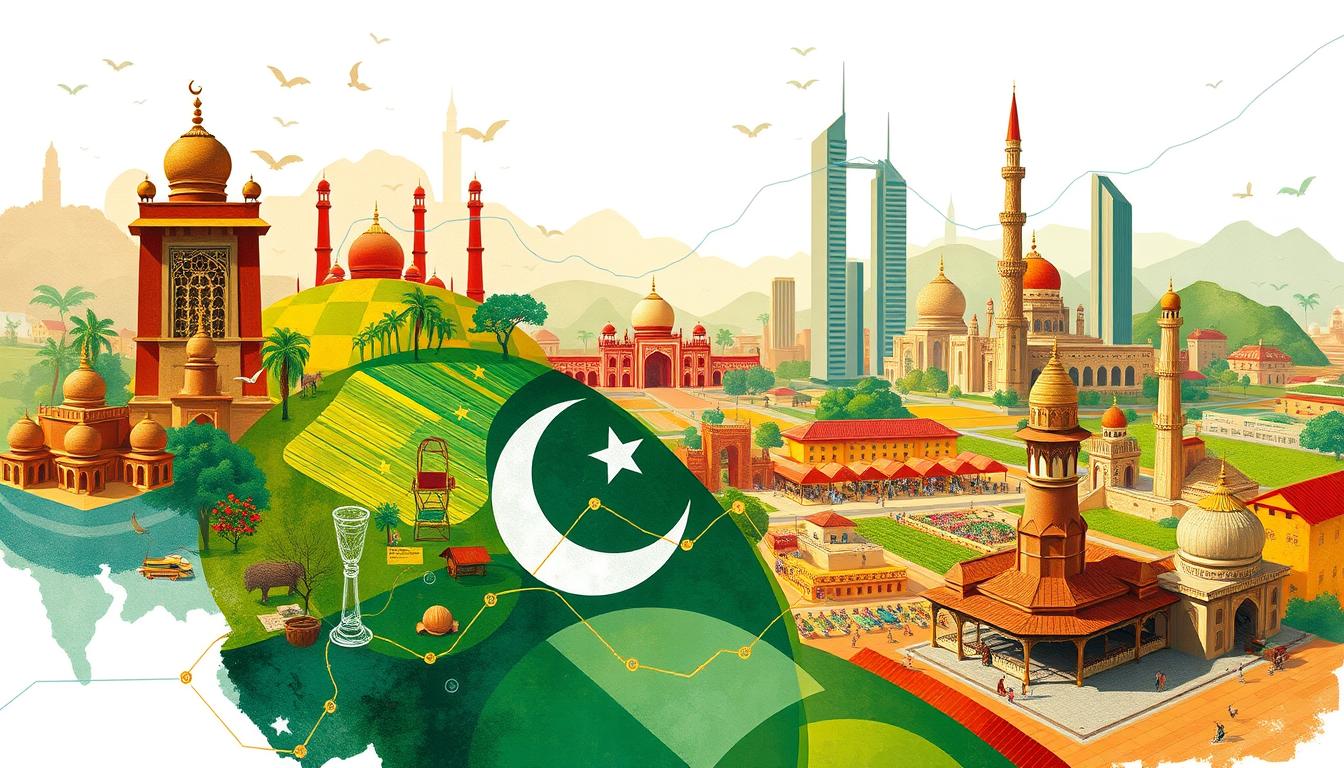Pakistan’s economic journey since 1947 is complex and full of twists. It has faced many challenges but also made significant strides. This article explores the key factors, hurdles, and future of the Pakistani economy. It aims to give a deep understanding of its growth and what shapes its future.
Key Takeaways
- Pakistan’s economy has seen ups and downs since 1947.
- The agricultural and manufacturing sectors are crucial for its growth.
- Exports, foreign investment, and remittances are vital for progress.
- Fiscal and monetary policies impact stability, with challenges in taxation and revenue.
- Poverty and income inequality are big issues the government is tackling.
Pakistan’s Economic Journey: From Partition to Present
Since gaining independence in 1947, the Pakistan economy has seen a lot of change. It has faced many challenges but also made great progress. The story of the Pakistan economy is one of hard work, adapting, and always moving forward.
In the early years, Pakistan had to overcome big obstacles. It needed to rebuild, create institutions, and attract foreign investment. But with the help of its people and smart economic plans, Pakistan started to grow.
The agriculture industry and manufacturing sector were key to Pakistan’s growth. They helped increase exports and create jobs. Also, money sent back by Pakistanis working abroad was a big help, supporting the economy and helping the poor.
“The story of the Pakistan economy is one of resilience, adaptation, and constant evolution.”
Over time, Pakistan’s economy kept changing, facing ups and downs. The country worked on its taxation and revenue generation to make its finances stronger.
Now, Pakistan’s economy is at a turning point. It has chances for growth but also faces big challenges. Finding a balance between growth and solving issues like income inequality and poverty alleviation will be key.
As Pakistan moves forward, it will learn from the past and look to the future. This will guide the country’s path in the global economy.
Key Drivers of Pakistan’s Economic Growth
Pakistan’s economy has grown thanks to several key factors. The agriculture and manufacturing sectors have been major contributors. Exports and foreign investment have also played important roles.
Contributions of Agriculture and Manufacturing
The agriculture industry is a big part of Pakistan’s economy. It makes up a lot of the country’s GDP and employs many people. New farming techniques and better crops have helped the sector grow.
The manufacturing sector has also grown a lot. It has seen more investment and new technology. This has helped Pakistan increase its exports and attract foreign investment.
Role of Exports and Foreign Investment
Pakistan has focused a lot on increasing exports to drive economic growth. The country has found new markets and products to sell. At the same time, foreign investment has brought in capital, technology, and expertise.
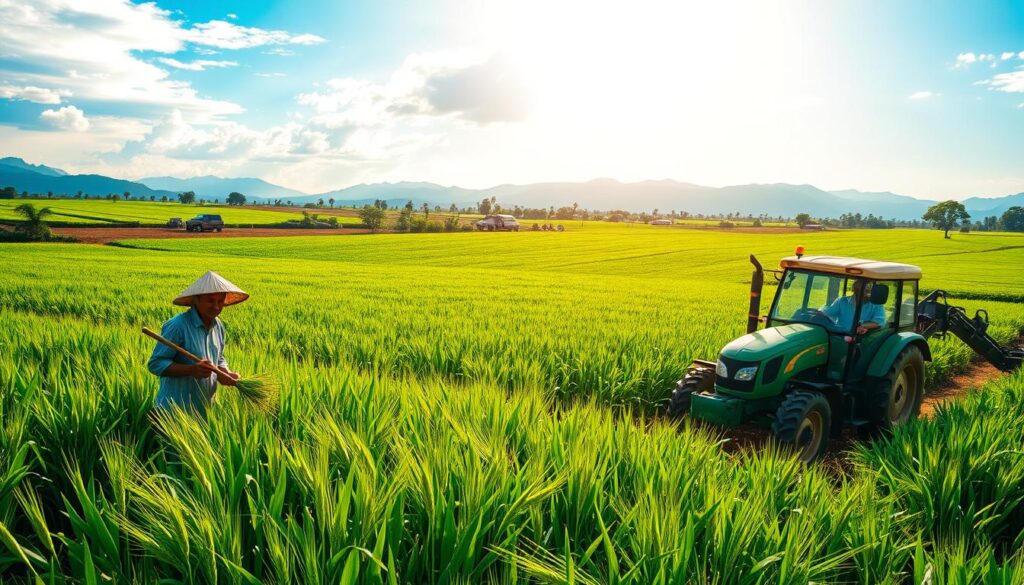
The agriculture and manufacturing sectors, along with a focus on exports and foreign investment, have been the cornerstones of Pakistan’s economic growth story.
Fiscal and Monetary Policies: Impact on Economic Stability
In Pakistan’s economy, the government’s fiscal and monetary policies are key. They shape the country’s stability. These policies include taxation, revenue, and monetary strategies, deeply affecting growth and development.
The government’s fiscal policy is closely watched. It balances how much money is collected and spent. Efforts to broaden the tax base and introduce policy reforms aim to fund economic challenges and ensure stability.
“Effective fiscal and monetary policies are the cornerstones of a thriving economy. Pakistan must strike the right balance to foster sustainable growth and address persistent economic hurdles,” remarked a leading economist.
The monetary policy by the State Bank of Pakistan is also vital. It includes adjusting interest rates and managing liquidity. These actions aim to control inflation, boost investment, and spur growth.
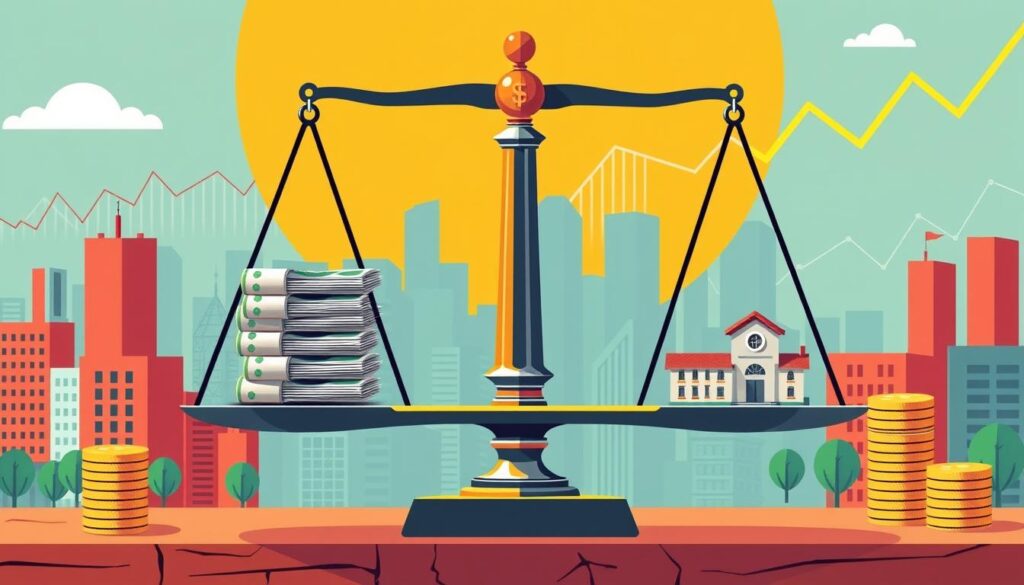
As Pakistan moves forward, managing fiscal policy and monetary policy well is crucial. The government’s smart use of these policies, along with a focus on taxation and revenue, will shape Pakistan’s economy. It will unlock the country’s full potential.
Challenges Faced by the Pakistan Economy
Pakistan is working hard to grow its economy. But, it faces many big challenges. Poverty and income inequality are two major problems.
Poverty Alleviation and Income Inequality
The government is trying to help those in poverty. But, many people in Pakistan still struggle. They need better jobs, education, and healthcare.
Income inequality is also a big issue. It makes the gap between rich and poor wider. This can harm social stability and slow down growth. To fix this, the government needs to make policies that help everyone.
“Poverty is a complex challenge that requires a multifaceted approach, one that addresses the root causes and empowers individuals to break the cycle of deprivation.”
The government and policymakers must keep working. They need to make the economy better for everyone. This will help Pakistan grow and prosper.
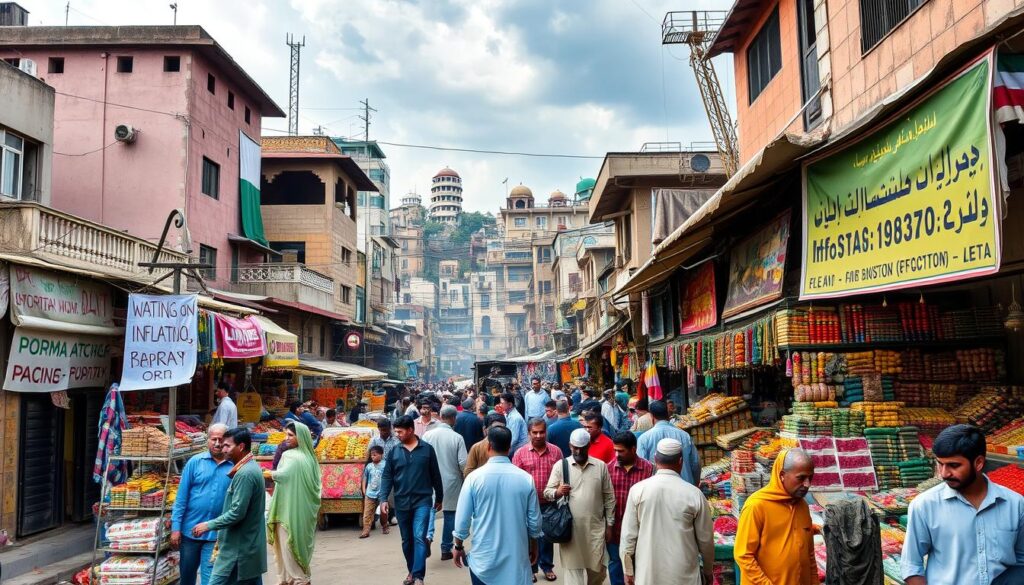
Pakistan Economy and Global Integration
Pakistan is working hard to join the global market. The country aims to attract more foreign investment, increase exports, and join international trade. This move is key for Pakistan’s economic growth.
Integrating with the world has its ups and downs. Foreign investment has boosted sectors like manufacturing and tech. Exports, especially textiles, have helped Pakistan’s economy grow and increased its foreign exchange reserves.
“Pakistan’s global integration has been a double-edged sword, bringing both benefits and complexities.”
But, this integration also brings risks. The Pakistani economy faces external shocks and volatility. Policymakers must balance national goals with global economic trends. The government is focused on using global integration to its advantage while managing risks.
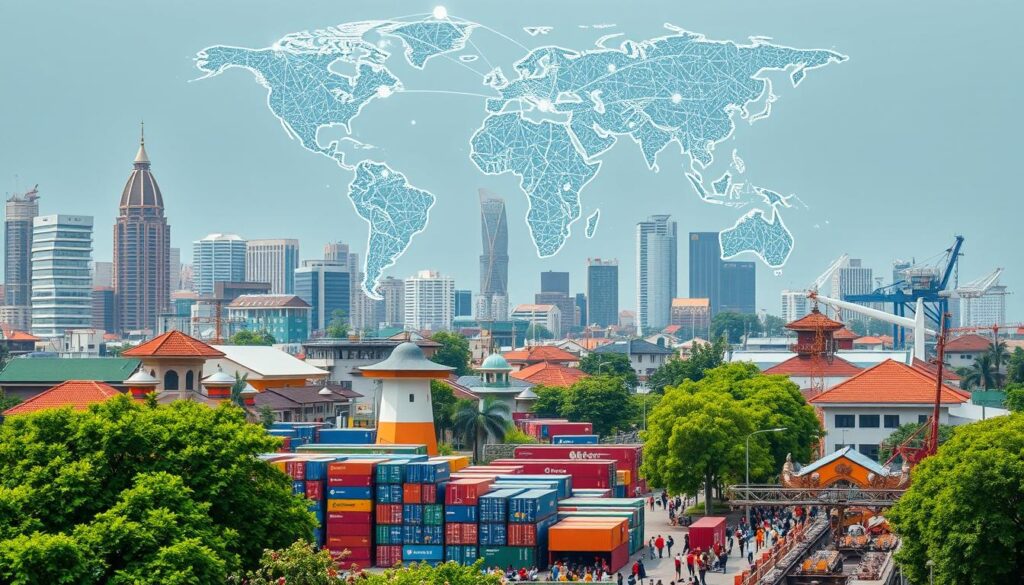
The future of Pakistan’s economy depends on its global engagement. The country needs to find new ways to attract foreign investment and boost exports. It must also work on infrastructure, skills, and regulations for sustainable growth.
Remittances: A Vital Lifeline for Pakistan’s Economy
In Pakistan’s economy, one key element is the flow of remittances from overseas Pakistanis. These funds, sent back home, are crucial for the country’s stability and growth.
Remittances are very important to the Pakistan economy. They help balance trade deficits and increase foreign exchange reserves. In fact, remittances often surpass foreign direct investment and exports.
“Remittances have become a lifeline for Pakistan’s economy, providing a steady stream of foreign currency and supporting household incomes.”
Remittances also act as a social safety net. They help families meet basic needs, invest in education, and improve living standards. This support is especially important during economic downturns.
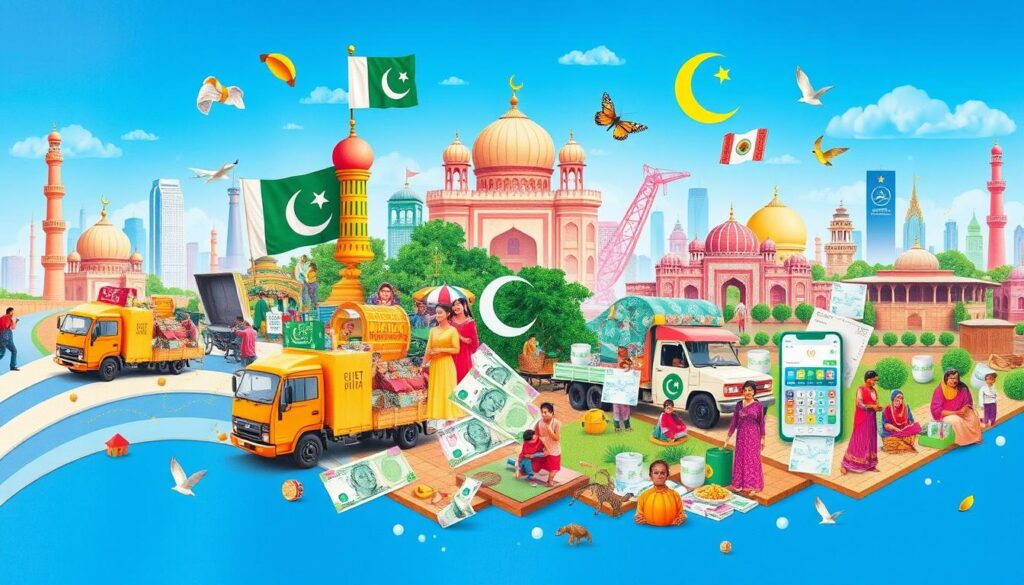
As Pakistan faces economic challenges, remittances will become even more crucial. Policymakers and economists are working to make the most of this resource. They aim to create policies that encourage more funds to flow from overseas Pakistanis.
Taxation and Revenue Generation Strategies
Pakistan’s economy is growing, and the government is focusing more on taxes. They want a strong tax base. So, they’re working on making the tax system better and wider.
They’re focusing on making the tax base bigger. This means getting more people and businesses to pay taxes. The goal is to make more money and share the tax load fairly. They’re making tax rules clearer and easier to follow.
Broadening the Tax Base and Policy Reforms
The government is making it easier to file taxes and using new tech to help. They’re also getting tougher on tax cheats. And they’re making rules that encourage people to pay their taxes on time.
“Broadening the tax base is crucial for sustainable economic growth and development. By ensuring that all individuals and businesses contribute their fair share, we can bolster our revenue generation capabilities and fund vital public services.”
The government is always looking to improve its tax plans. This is important for Pakistan’s economy.
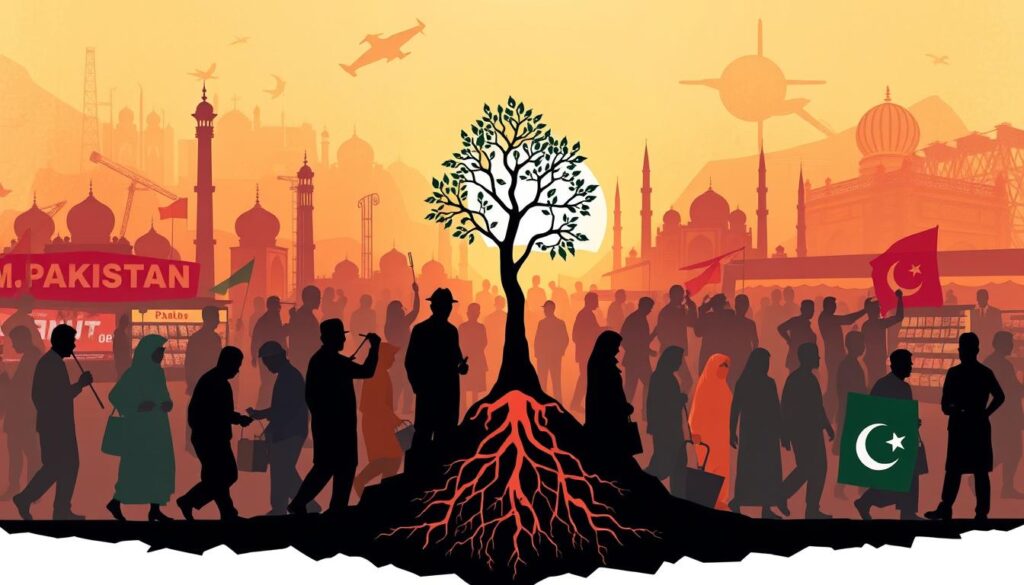
Pakistan Economy: Opportunities and Prospects
Pakistan’s economy is on the rise, thanks to a young and growing population. The Pakistan economy is ready to explore new paths for economic growth. The government is working hard to draw in foreign investment and boost export industries.
The tech and innovation sector in Pakistan is booming. The country’s tech-savvy youth and start-up hubs are catching the world’s eye. The government’s push for digital infrastructure and skills is making Pakistan a hotspot for tech investments.
“Pakistan’s economy holds immense potential for growth and prosperity. By harnessing our natural resources, prioritizing human capital, and fostering a business-friendly environment, we are confident in our ability to unlock the country’s true economic might.”
Pakistan’s strategic location in South Asia is a big opportunity. The China-Pakistan Economic Corridor (CPEC) is changing the country’s infrastructure. This is opening doors for more trade and economic prospects.
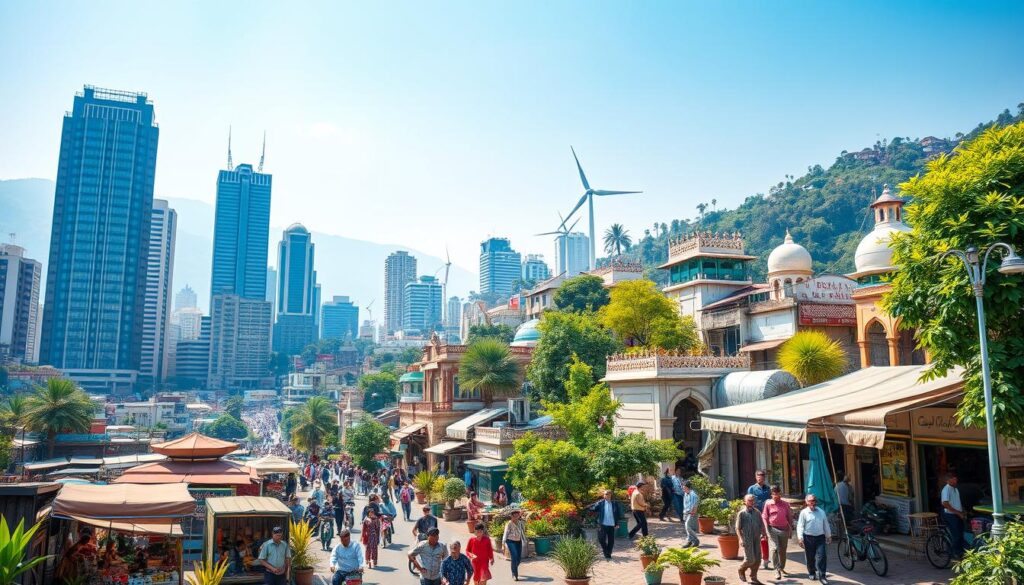
Despite challenges, the Pakistani government is committed to economic reforms. The people’s resilience adds to the optimism. As Pakistan moves forward, the prospects for the Pakistan economy look promising, with a chance for lasting growth and prosperity.
Balancing Economic Growth and Sustainable Development
Pakistan is working hard to grow its economy. But, it’s also important to do this in a way that’s good for the environment. The government is trying to find a balance between growing the economy and taking care of the planet.
One big challenge is climate change. It could hurt Pakistan’s future a lot. So, the government is focusing on clean energy like solar and wind power. This helps reduce pollution and use less oil.
They’re also working on making energy use more efficient. Improving how we manage waste and protecting nature are other key goals. This includes keeping forests, water, and wildlife safe.
But it’s not just about the environment. The government wants to make sure everyone benefits from economic growth. They’re working on programs to help the poor and reduce income gaps. This includes better education, healthcare, and jobs in green industries.
- Pakistan's Economic Journey: From Partition to Present
- Key Drivers of Pakistan's Economic Growth
- Fiscal and Monetary Policies: Impact on Economic Stability
- Challenges Faced by the Pakistan Economy
- Pakistan Economy and Global Integration
- Remittances: A Vital Lifeline for Pakistan's Economy
- Taxation and Revenue Generation Strategies
- Pakistan Economy: Opportunities and Prospects
- Balancing Economic Growth and Sustainable Development
